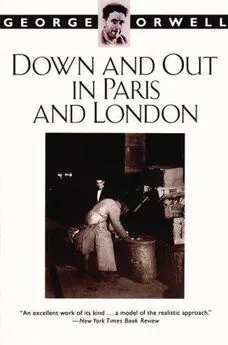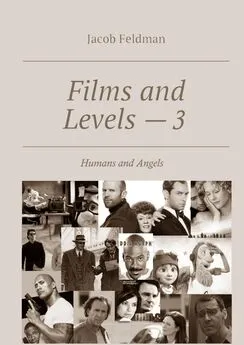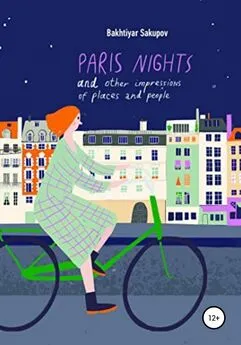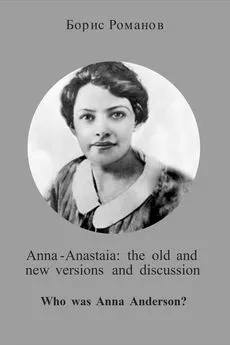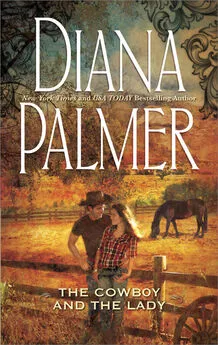George Orwell - Down and Out in Paris and London
- Название:Down and Out in Paris and London
- Автор:
- Жанр:
- Издательство:неизвестно
- Год:неизвестен
- ISBN:нет данных
- Рейтинг:
- Избранное:Добавить в избранное
-
Отзывы:
-
Ваша оценка:
George Orwell - Down and Out in Paris and London краткое содержание
Down and Out in Paris and London - читать онлайн бесплатно полную версию (весь текст целиком)
Интервал:
Закладка:
trooped off to bed, under the command of the officers.
The dormitory was a great attic like a barrack room, with
sixty or seventy beds in it. They were clean and tolerably
comfortable, but very narrow and very close together, so
that one breathed straight into one's neighbour's face.
Two officers slept in the room, to see that there was no
smoking and no talking after lights-out. Paddy and I had
scarcely a wink of sleep, for there was a man near us
who had some nervous trouble, shellshock perhaps,
which made him cry out "Pip!" at irregular intervals. It
was a loud, startling noise, something like the toot of a
small motor-horn. You never knew when it was coming,
and it was a sure preventer of sleep. It appeared that Pip,
as the others called him, slept regularly in the shelter,
and he must have kept ten or twenty people awake every
night. He was an example of the kind of thing that
prevents one from ever getting enough sleep when men
are herded as they are in these lodging-houses.
At seven another whistle blew, and the officers went
round shaking those who did not get up at once. Since
then I have slept in a number of Salvation Army
shelters, and found that, though the different houses
vary a little, this semi-military discipline is the same in
all of them. They are certainly cheap, but they are too
like workhouses for my taste. In some of them there is
even a compulsory religious service once or twice a week,
which the lodgers must attend or leave the house. The fact
is that the Salvation Army are so in the habit of thinking
themselves a charitable body that they cannot even run a
lodging-house without making it stink of charity.
At ten I went to B.'s office and asked him to lend me a
pound. He gave me two pounds and told me to come again
when necessary, so that Paddy and I were free of money
troubles for a week at least. We loitered the day in
Trafalgar Square, looking for a friend of Paddy's who
never turned up, and at night went to a lodginghouse in a
back alley near the Strand. The charge was elevenpence,
but it was a dark, evil-smelling place, and a notorious
haunt of the "nancy boys." Downstairs, in the murky
kitchen, three ambiguous-looking youths in smartish blue
suits were sitting on a bench apart, ignored by the other
lodgers. I suppose they were "nancy boys." They looked
the same type as the apache boys one sees in Paris, except
that they wore no sidewhiskers. In front of the fire a fully
dressed man and a stark-naked man were bargaining. They
were newspaper sellers. The dressed man was selling his
clothes to the naked man. He said:
"'Ere y'are, the best rig-out you ever 'ad. A tosheroon
[half a crown] for the coat, two 'ogs for the trousers, one
and a tanner for the boots, and a 'og for the cap and scarf.
That's seven bob."
"You got a 'ope! I'll give yer one and a tanner for the
coat, a 'og for the trousers, and two 'ogs for the rest.
That's four and a tanner."
"Take the 'ole lot for five and a tanner, chum."
"Right y'are, off with 'em. I got to get out to sell my late
edition."
The clothed man stripped, and in three minutes their
positions were reversed; the naked man dressed, and the
other kilted with a sheet of the Daily Mail.
The dormitory was dark and close, with fifteen beds in
it. There was a horrible hot reek of urine, so beastly that at
first one tried to breathe in small, shallow puffs, not filling
one's lungs to the bottom. As I lay down in bed a man
loomed out of the darkness, leant over me and began
babbling in an educated, half-drunken voice:
"An old public school boy, what? [He had heard me
say something to Paddy.] Don't meet many of the old
school here. I am an old Etonian. You know-twenty years
hence this weather and all that." He began to quaver out
the Eton boating-song, not untunefully:
"Jolly boating weather,
And a hay harvest---"
"Stop that----
noise!" shouted several lodgers.
"Low types," said the old Etonian, "very low types. Funny
sort of place for you and me, eh? Do you know what my
friends say to me? They say, 'M-, you are past
redemption.' Quite true, I am past redemption.
I've come down in the world; not like these-----
s here,
who couldn't come down if they tried. We chaps who
have come down ought to hang together a bit. Youth will
be still in our faces-you know. May I offer you a drink?"
He produced a bottle of cherry brandy, and at the same
moment lost his balance and fell heavily across my legs.
Paddy, who was undressing, pulled him upright.
"Get back to yer bed, you silly ole-----
!"
The old Etonian walked unsteadily to his bed and
crawled under the sheets with all his clothes on, even his
boots. Several times in the night I heard him murmuring,
"M-, you are past redemption," as though the phrase
appealed to him. In the morning he was
lying asleep fully dressed, with the bottle clasped in his
arms. He was a man of about fifty, with a refined, worn
face, and, curiously enough, quite fashionably dressed. It
was queer to see his good patent-leather shoes sticking out
of that filthy bed. It occurred to me, too, that the cherry
brandy must have cost the equivalent of a fortnight's
lodging, so he could not have been seriously hard up.
Perhaps he frequented common lodginghouses in search of
the "nancy boys."
The beds were not more than two feet apart. About
midnight I woke up to find that the man next to me was
trying to steal the money from beneath my pillow. He was
pretending to be asleep while he did it, sliding his hand
under the pillow as gently as a rat. In the morning I saw
that he was a hunchback, with long, apelike arms. I told
Paddy about the attempted theft. He laughed and said:
"Christ! You got to get used to dat. Dese lodgin'
houses is full o' thieves. In some houses dere's notlain'
safe but to sleep wid all yer clo'es on. I seen 'em steal a
wooden leg off a cripple before now. Once I see a man-
fourteen stone man he was-come into a lodgin'-house wid
four pound ten. He puts it under his mattress. 'Now,' he
says, 'any dat touches dat money does it over my body,'
he says. But dey done him all de same. In de mornin' he
woke up on de floor. Four fellers had took his mattress by
de corners an' lifted him off as light as a feather. He never
saw his four pound ten again."
XXX
THE next morning we began looking once more for
Paddy's friend, who was called Bozo, and was a screever-
that is, a pavement artist. Addresses did
not exist in Paddy's world, but he had a vague idea that
Bozo might be found in Lambeth, and in the end we ran
across him on the Embankment, where he had established
himself not far from Waterloo Bridge. He was kneeling on
the pavement with a box of chalks, copying a sketch of
Winston Churchill from a penny note-book. The likeness
was not at all bad. Bozo was a small, dark, hook-nosed
man, with curly hair growing low on his head. His right
leg was dreadfully deformed, the foot being twisted heel
forward in a way horrible to see. From his appearance one
could have taken him for a Jew, but he used to deny this
vigorously. He spoke of his hook-nose as "Roman," and
was proud of his resemblance to some Roman Emperor-it
was Vespasian, I think.
Bozo had a strange way of talking, Cockneyfied and
yet very lucid and expressive. It was as though he had
read good books but had never troubled to correct his
grammar. For a while Paddy and I stayed on the
Embankment, talking, and Bozo gave us an account of the
screeving trade. I repeat what he said more or less in his
own words.
"I'm what they call a serious screever. I don't draw in
blackboard chalks like these others, I use proper colours
the same as what painters use; bloody expensive they are,
especially the reds. I use five bobs' worth of colours in a
long day, and never less than two bobs' worth.' Cartoons
is my line-you know, politics and cricket and that. Look
here"-he showed me his notebook-"here's likenesses of all
the political blokes, what I've copied from the papers. I
have a different cartoon every day. For instance, when the
Budget was on I had one of Winston trying to push an
elephant
1
Pavement artists buy their colours in the form of powder,
and work them into cakes with condensed milk
.
marked 'Debt,' and underneath I wrote, 'Will he budge
it?' See? You can have cartoons about any of the parties,
but you mustn't put anything in favour of Socialism,
because the police won't stand it. Once I did a cartoon of
a boa constrictor marked Capital swallowing a rabbit
marked Labour. The copper came along and saw it, and
he says, 'You rub that out, and look sharp about it,' he
says. I had to rub it out. The copper's got the right to
move you on for loitering, and it's no good giving them a
back answer."
I asked Bozo what one could earn at screeving. He
said:
"This time of year, when it don't rain, I take about three
quid between Friday and Sunday-people get their wages
Fridays, you see. I can't work when it rains; the colours
get washed off straight away. Take the year round, I make
about a pound a week, because you can't do much in the
winter. Boat Race day, and Cup Final day, I've took as
much as four pounds. But you have to cut it out of them,
you know; you don't take a bob if you just sit and look at
them. A halfpenny's the usual drop [gift], and you don't
get even that unless you give them a bit of backchat.
Once they've answered you they feel ashamed not to give
you a drop. The best thing's to keep changing your
picture, because when they see you drawing they'll stop
and watch you. The trouble is, the beggars scatter as soon
as you turn round with the hat. You really want a nobber
[assistant] at this game. You keep at work and get a crowd
watching you, and the nobber comes casual-like round the
back of them. They don't know he's the nobber. Then
suddenly he pulls his cap off, and you got them between
two fires like. You'll never get a drop off real toffs. It's
shabby sort of blokes you get most off, and foreigners.
I've had even sixpences off Japs, and blackies, and that.
They're not so bloody mean as what an Englishman is.
Another thing to remember is to keep your money
covered up, except perhaps a penny in the hat. People
won't give you anything if they see you got a bob or two
already."
Bozo had the deepest contempt for the other screevves
on the Embankment. He called them "the salmon
platers." At that time there was a screever almost every
twenty-five yards along the Embankmenttwenty-five
yards being the recognised minimum between pitches.
Bozo contemptuously pointed out an old white-bearded
screever fifty yards away.
"You see that silly old fool? He's bin doing the same
picture every day for ten years. 'A faithful friend' he calls
it. It's of a dog pulling a child out of the water. The silly
old bastard can't draw any better than a child of ten. He's
Читать дальшеИнтервал:
Закладка:
